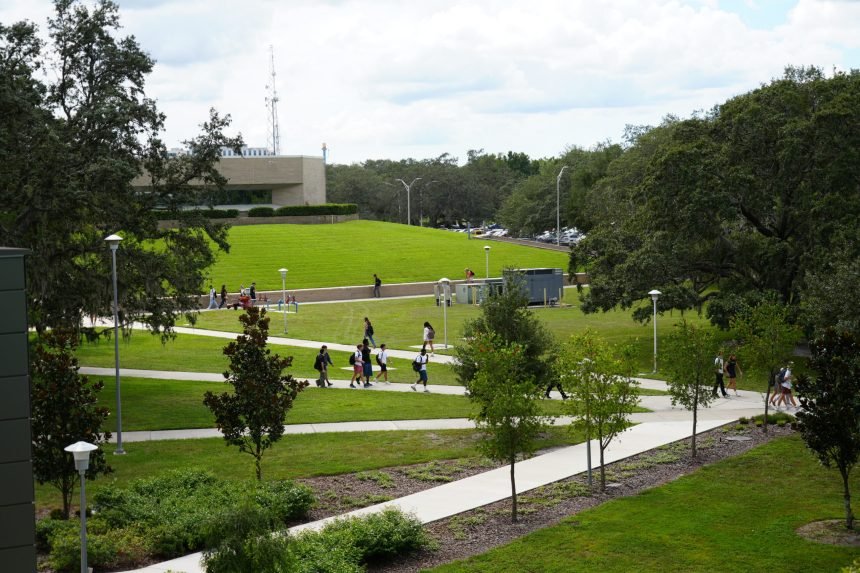USF’s Vinik Sport & Entertainment Management Program reached its highest milestone yet — ranking No. 2 in the world and No. 1 in Florida this September in the 2025 SportBusiness Postgraduate Rankings.
SportBusiness measures sports programs across the globe using surveys of “course leaders” and alumni from each program to compare curriculum and partnerships, according to its website.
Michelle Harrolle, the program’s director, said it has steadily gained recognition over the years, moving from No. 4 in the world last year to No. 2 this year.
Harrolle said the program was founded in 2012 and only admits about 30 students annually, focusing exclusively on graduate-level education.
Located in the School of Hospitality and Sport Management within the Muma College of Business, the program prepares students for leadership roles in the sports and entertainment industry, Harrolle said.
Students in the program earn both a Master of Science in Sport and Entertainment Management and a Master of Business Administration with a concentration in Sport Business.
Faculty and students said the program being ranked No. 2 in the world and No. 1 in Florida reflects a model built on professional access, mentorship and long-term career development.
Related: USF graduate programs gain national attention in latest U.S. News ranking
The program is named after Jeff and Penny Vinik — the former owners of the Tampa Bay Lightning — whose financial support helped establish the program and its early connections to local sports organizations, according to USF.
As part of the program’s curriculum, students work directly with professional partners, such as the Tampa Bay Lightning, Tampa Bay Buccaneers and the Benchmark International Arena.
Students gain hands-on experience working with those partners on projects ranging from marketing and analytics to event operations and fan engagement. They also take courses focused on leadership, analytics and real-world application.
Michael Mondello, the program’s assistant director, said the program’s partnerships are a “major advantage.”
“Having all the different partners that we have within an hour of campus is really enticing,” he said. “Our faculty all align on student success, and our alumni buy in. They are hired from the program and come back as guest speakers. They keep the circle going.”
Harrolle said the program stands out in its “emphasis” on human connection.
“We talk a lot about relationships — with our students, with our alumni, with other peer institutions, with our partners,” she said. “That’s probably one of the biggest reasons why we are so successful.”
This philosophy is backed by a structured mentorship system.
In their first year, each student is paired with an alumni mentor, a peer mentor and a faculty advisor.
Students can also participate in domestic and international networking trips, where they meet industry executives and explore global sports business models.
Related: USF’s School of Hospitality and Sport Management prepares students for a merging industry
For second-year Vinik program student Katie Beard, the new ranking serves as motivation.
“It’s an honor, but you want to live up to that standard yourself,” Beard said. “I want to keep these ratings high. I want to get a job immediately after graduation. It reminds me of my goals.”
Beard said the program doesn’t offer “traditional” classes. Instead, it creates a “close-knit group” of students through projects.
“We’re always working together,” she said. “We collaborate not just with classmates, but with faculty and the entire Tampa Bay community.”
Beard said the program is “hands-on” and has helped her grow both personally and professionally during her time with the program.
She said she worked on projects with local sports teams and organizations, such as the Tampa Bay Buccaneers and the USF Football Team, and has gained experience in areas like event operations, marketing and analytics.
Related: USF students share setbacks, successes in internship hunt
Beard said the small number of students in the program helps them feel seen.
“The faculty can get to know you,” Beard said. “They get to know exactly what you want out of the program and where you want to be.”
When applying, students must submit three letters of recommendation, GMAT or GRE scores and any college or university transcripts, according to the program’s admissions page.
Students are chosen based on the “entirety” of their applications and prior academic performances, according to the page.
The program has a 27% acceptance rate, according to SportBusiness.
Harrolle said the program’s size allows students to be more involved with the program, their classmates and mentors.
“The small cohort allows us to provide intensive mentorship, networking trips and even global experiences,” she said. “These are opportunities that are rare in other programs.”
With Vinik’s newest recognition, Harrolle said the program is no longer just a rising contender — it’s a global benchmark.
Still, Harrolle said the mindset inside the halls of the Muma College of Business is more about sustaining than winning.
“[It’s about] continuing to do what we’re doing,” Harrolle said. “It’s not just about rankings. It’s about ensuring the work we do benefits students and the industry.”











